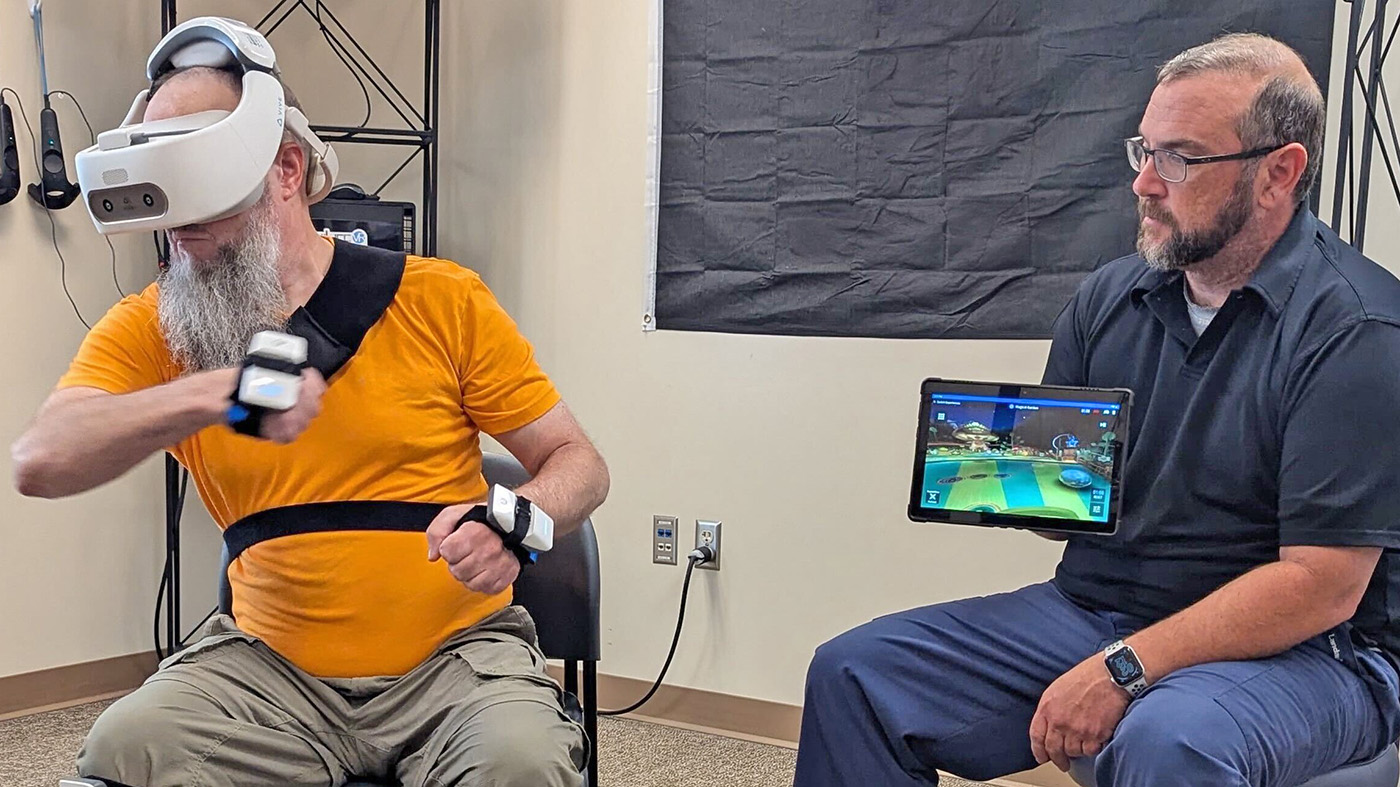Army National Guard Veteran Jeff Cook was medically retired from service in 2005, and he has since been diagnosed with diabetes and Multiple Sclerosis (MS). With the help of Central Iowa VA and physical therapist assistant David McAdon, Cook has found a sanctuary with virtual reality (VR) that has aided in his care.
Cook began his journey with VR, the most immersive type of “immersive technology,” in October 2023 after connecting with McAdon, who put Cook’s head into a headset to work on his balance issues. VR provided a method of vestibular testing while also supporting his restorative therapy.
“We’re able to use the equipment to see if I’m leaning favoring my right or left side, then we can use the technology to balance me out. When McAdon saw I was favoring my left side, he was able to set the software to focus on more movements that work my right side,” Cook explained.
Virtual environments making a real difference
The exercises improve balance over time and have helped Cook (pictured above) stay active in a fun and engaging way.
“The first thing I noticed is that, if I’m having a fatigue day and I’m not able to do the normal activities I would do to exercise and stretch, having VR would give me other options that I could still engage in a safer manner, not having to expend too much energy,” he said.
Not only has Cook experienced physical improvements, but he also benefits mentally. “In college, I used to play racquetball, but when I was diagnosed with MS, that was one of the activities I had to give up. But I can play a 360-degree racquetball game with VR. To be given something back again was really humbling.”
In combination with the therapies, Cook is also able to work on mindfulness. Being able to focus on the present moment has been helpful for him.
As technology evolves, so do possibilities. There are virtual programs for almost everyone, depending on the type of activity and outcome desired.
“Some Vets have an easier time doing everyday activities. There was one gentleman who had a hard time putting on socks so they were able to find activities that mimic that movement for him,” Cook shared.
Frontline staff: Going above and beyond
Cook is grateful for the ways VR has transformed his life, but he is especially thankful for McAdon, who administers the therapy twice a week.
As for the future of VR in VA, Cook believes more Veterans should access this technology. “Everybody has the same passion. We want to help the Veterans and provide these opportunities,” he added.
VA has deployed over 3,500 VR headsets across more than 170 VA medical centers and outpatient clinics in all 50 U.S. states, Puerto Rico, Guam and American Samoa with over 40 documented use cases and over 10,000 Veteran experiences to date.
To learn more, visit the VA Immersive website and check out the YouTube playlist.
Topics in this story
Link Disclaimer
This page includes links to other websites outside our control and jurisdiction. VA is not responsible for the privacy practices or the content of non-VA Web sites. We encourage you to review the privacy policy or terms and conditions of those sites to fully understand what information is collected and how it is used.
More Stories
As severe weather threatened Mississippi, local news warned of a dangerous outbreak of tornadoes. A VA nurse stepped up.
Dorothy “Pat” Rudd, 103, World War II Navy Veteran, has lived a life of service, pioneering the way for women in the military.
VA employees help return WWII items to two brothers’ families. Both brothers were WWII Veterans.





